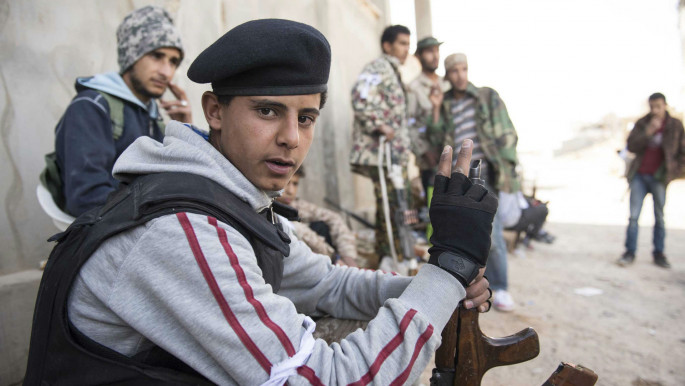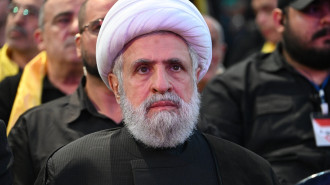UN talks about talks as Libya tears itself apart
For months, Libya has been split into two camps, hastily baptised "Islamists" and "liberals", each with their own governments and military forces. The battle for ultimate power has lead to months of violence, hundreds of deaths and rising instability.
The UN, meanwhile, is failing to make its voice heard. Seven communiques were issued in December, each as futile as the last: the UN continues to "condemn" the attacks and "call for an end to the violence", but to no effect. Fighting has intensified.
This violence is linked to a political crisis that has been tearing Libya apart since last May, when Khalifa Haftar, a former Gadaffi colonel who later aligned with the US, launched Operation Dignity to "cleanse" Benghazi of "terrorists" - his umbrella term for groups he opposes including Ansar al-Sharia and the February 17 militia.
In July 2014, the situation deteriorated when the Fajr Libya ("Libya Dawn") coalition attacked the Zintan Brigades. The Zintan Brigades are accused of stealing, kidnapping and supporting the old regime, while Libya Dawn are considered Islamists aligned with the Muslim Brotherhood.
Based on the principle that "the enemy of my enemy is my friend", Libya Dawn supports Islamist groups which oppose Haftar in Benghazi, whilst the Zintanis are allied with the former colonel.
| We're just discussing the way in which the discussions should be held... the real issue has not even been tackled. |
Libya Dawn also took control of Tripoli in August, forcing the internationally recognised parliament, the House of Representatives, to flee to Tobruk only months after its election in June.
Libya Dawn then reinstated the parliament's predecessor, the General National Congress, to sit in Tripoli, while the Tripoli-based Supreme Court ruled the Tobruk parliament invalid. The result was two governments in one country - both supported by heavily armed military wings, and both claiming legitimacy.
Struggling UN diplomacy
This stalemate has not aided the work of Bernardino Leon, the UN's special representative in Libya. He organised a first round of negotiations between the two camps for 29 September, but refused to talk to Tripoli congress members.
"Ghadames I", as the talks were known, served only to bring together factions within the Tobruk parliament, some of whom support Libya Dawn and refused to sit in Tobruk.
"It's as though it was decided to have a person discuss something with himself," said Mosadek Hobara, who works in Libya for the NGO, the Centre for Humanitarian Dialogue. The response of Libya Dawn supporters was stark: Since September, placards have appeared in Tripoli showing the face of the special representative, blood-spattered or marked with a cross and bearing the words "Leon - you're not welcome in Libya".
The UN Support Mission in Libya (Unsmil) has since reviewed its position, especially given the Supreme Court declaration on Tobruk.
"On the one hand, we were hoping for this decision, which has given us a reason to open dialogue and engage in discussion with the other side. On the other, we cannot officially recognise it, because it was taken under duress," one western diplomat told al-Araby al-Jadeed.
He added that the international community could not recognise the Tripoli congress given that June elections which replaced it were free and fair.
 |
|
| Fighting between the two sides has been fierce. Here Libya Dawn fighters take shelter behind a wall in Kikla, November 2014 [Ahmet Izgi/Anadolu/Getty] |
On 11 November, Leon met Nouri Abusahmein, who is named as president of the Tripoli congress. However, the UN said Leon had met Abusahmein as a "political figure", and referred to Abdullah al-Thini, the head of the Tobruk government, as "prime minister".
Libya Dawn took the references as an insult, and Abusahmein was later photographed in front of a banner bearing the words "Libyan State, President of the General National Congress".
"Ghadames II" was then announced to begin in the week of 8 December, and was opened to members of the Tripoli congress and armed groups excluding Ansar al-Sharia, which is classed as a terrorist organisation by the UN.
But the discussions were postponed until January, with no mention of a specific date. Tripoli and Tobruk had set out their conditions - both wanted to be considered the sole, legitimate body in Libya, and refused discussion with the "criminals" - a reference to fighters on the opposite side.
"It's awful, because we're just discussing the way in which the discussions should be held," one diplomat told al-Araby. "The real issue... is a long way from being resolved."
Military intervention?
The uncoordinated behaviour of the international community makes this all the more true. Algeria and Sudan wish to organise negotiations at home, with proposals that overlap with the work of the UN. The Sahel G5 (Chad, Mali, Niger Mauritania and Burkina Faso) has meanwhile requested an "international force for neutralising armed groups".
| Attacking without any political solution is sterile. - French defence minister |
France however, appears hesitant. In September, the French defence minister, Jean-Yves Drian, told Le Figaro that "action in Libya" was necessary. In December, however, he told the Journal du Dimanche that attacking without a political solution was pointless.
He added: "I'm convinced the time has come to face the question of Libya. In 2015, the African Union, the United Nations and neighbouring countries must address this burning security issue."
Other countries have also taken sides. Egypt and the UAE support Tobruk. The US has said both organised airstrikes in Libya in August in support of Khalifa Haftar. Abdel Fatah el-Sisi, the Egyptian president, said in Paris last November that "Libya could become fertile ground for Takfirism" (Islamist extremism), and called for intervention "as fast as possible".
Libya Dawn has claimed to have support - both moral and material - from Qatar, although this has not been established as fact.
Political leaders also disagree on the problems that need immediate attention: Sisi is worried about the situation in Derna, a town in eastern Libya where armed groups have pledged allegiance to the Islamic State group.
France is worried about the south, where Mokhtar Belmokhtar, the head of al-Qaeda in the Islamic Maghreb (AQIM) and Iyad Ag Ghali, the head of Ansar al-Dine, were both seen recently.
One thing is certain: the crisis in Libya presents terrorist groups with opportunities for expansion, and talk is cheap when confronted with such a threat.
A version of this article was first published by our partner website, Orient XXI.





 Follow the Middle East's top stories in English at The New Arab on Google News
Follow the Middle East's top stories in English at The New Arab on Google News


